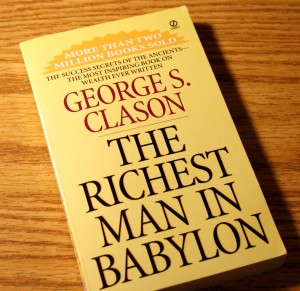 The description reads, “The success secrets of the ancients ““ the most inspiring book on wealth ever created.” George S. Clason’s The Richest Man in Babylon was written as a series of pamphlets distributed by banks and insurance companies which were bound together in 1926. 88 years later, the 144-page manual on wealth creation continues to inspire countless readers to this day.
The description reads, “The success secrets of the ancients ““ the most inspiring book on wealth ever created.” George S. Clason’s The Richest Man in Babylon was written as a series of pamphlets distributed by banks and insurance companies which were bound together in 1926. 88 years later, the 144-page manual on wealth creation continues to inspire countless readers to this day.
It was this book that set me off on a quest to become a master of how my money would be spent. I have highlighted, this passage, which really changed my thinking in terms of how I would treat my money:
“Every gold piece you save is a slave to work for you. Every copper it earns is its child that also can earn for you. If you would become wealthy, then what you save must earn, and its children must earn, that all may help to give to you the abundance you crave.”
Money is a commodity, which can create enjoyment in life. If we truly want more enjoyment from our income sources, it makes sense that we would be very mindful of how we spend each dollar so that we can keep more to buy the things that matter most to us. Each week, I share ideas that can help you keep more of your own money through smarter spending without turning your life upside down. An extra $200 to $400 saved at the grocery store can help you accumulate gold pieces to work for you”¦ at today’s prices, an ounce of gold after three to six months, anyway.
Clason also points out, “In those things toward which we exerted our best endeavors we succeeded.” After reading this book, I became nearly obsessed with the concept of better financial stewardship. If I was going to give out my gold pieces, you better believe it would be to the places I felt gave greatest value and satisfaction. Extra profit to food manufacturers and retailers (as much as I appreciate them) was not high on my list. I read every book I could find about saving money on groceries and other consumables. The advice ranged from time-consuming tasks like making your own soap and clothing to smartly using coupons ““ something I was willing to try.
I tried ““ but didn’t stick with soap making. I didn’t bother with stitching my own clothes, and thankfully, I had some early successes in couponing. That led to me never giving up on this new method of shopping.
My advice to you is to find a new money-saving strategy that you can stick with for a year. That might be becoming much more savvy on how to save money with your utility bills, auto expenses, or food. You’ll get much better at this skill as you continue. I recently created a library of low-cost video eCourses that teach simple money-saving strategies for busy people at SavingsAngel.com. If you’d like to become a better steward over your money, beyond simple consumer tips, I teach the mindset necessary for always getting the best deals. In the words of Clason, “Our acts can be no wiser than our thoughts.”
[quote size=”small” style=”none”]I’ve committed to re-reading The Richest Man in Babylon and will be blogging about it over the next ten weeks. You’re welcome to follow my free 10-week series at SavingsAngel.com/blog. Add your email address above (right) to get notification when a new chapter & article is added.[/quote]
The people who live with the greatest amount of abundance seem to enjoy learning about it. They also use any dissatisfactions in life to direct them on what to learn next. Clason pens, “Learning was of two kinds: the one being the things we learned and knew, and the other being the training that taught us how to find out what we did not know?“
There’s no point in suffering with any money ailment if that ailment can be cured through knowledge and action. Despite what your income may be, there are seemingly infinite ways to live more abundantly while spending less money – and I’m honored to be with you on that journey of discovery.


